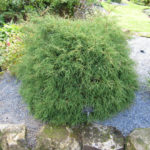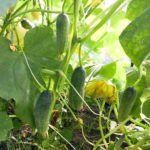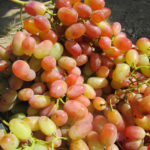Potato variety Sonny
Sonny is a late-ripening variety of potatoes (Solanum tuberosum) of national selection. The date and place of its origin are unknown, but it is believed that it was bred by Belarusian amateur potato growers. Among gardeners, another name for it is widespread - "Bogatyr". He got it thanks to the large size of the tubers. The variety is not included in the state register of plants of the Russian Federation and has not passed state tests. It has a universal purpose, it is cultivated only on personal household plots.
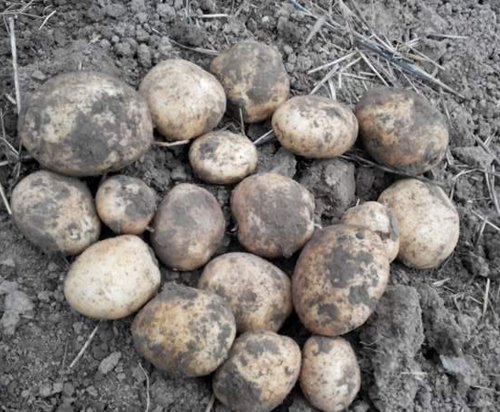
The time from the emergence of full shoots to harvest is 120-140 days.
The plant is compact, but rather tall, moderately spreading, the amount of green mass is medium or more. The main stem is erect or semi-erect. Leaves are medium in size, simple, matte dark green color. The edges of the leaf plate are slightly wavy. The flowers of the Sonny are white, collected in compact corollas, quickly fall off. Very few berries are produced.
The root system of potatoes is powerful, an average of 15-25 tubers are formed in one nest, but sometimes this number reaches as much as 40! The tubers are uniform, even in size, with an average weight of 85 grams, and sometimes there are record holders weighing more than 500 grams. They have a rounded flat shape and a smooth surface. The peel is thin, with a reticular structure, cream-colored, sometimes with a slight pinkish tinge, rough to the touch. The cut is light cream in color. The eyes are small, predominantly superficial, their greater number is observed closer to the top of the tuber.
The yield of the variety is very high - about 4-7 kg of tubers can be obtained from one plant. Depending on the type of soil, climatic conditions and agricultural technology, the figure can be either higher or lower. It is quite possible to receive up to 10 kg of potatoes from one nest. Unfortunately, there is no official data on the yield of the Sonny, since he was not subjected to state tests. However, according to gardeners, it can indeed produce an impressive number of large tubers.
The taste of this variety is very good. In cooking, it is versatile, suitable for preparing a wide variety of dishes. Especially suitable for roasting, roasting and mashed potatoes. The tubers have an average digestibility, after heat treatment they retain their shape, as well as a pleasant color, due to which the finished dish looks neat and very appetizing. The starch content in the pulp is 13-14%, the dry matter content is slightly increased.
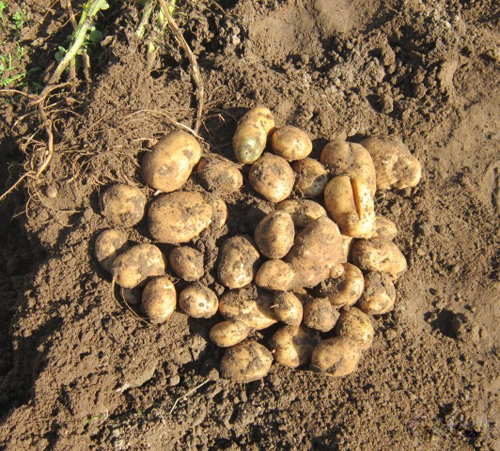
As for the preferred growing regions, there is little information on this issue. However, according to the observations of gardeners, plants are relatively undemanding to the type of soil, but show the best yield on fertile light soils. They are unpretentious in care, but respond well to watering and feeding. In the cultivation of this variety, there are a number of features that can be safely attributed to its merits.
Planting potatoes is recommended to be done exclusively with eyes. And this, in turn, means that from 1 kg of son's seed you can get two, or even three to four times more plants than you would get from planting 1 kg of tubers of other varieties. The technology of "cutting" the planting material is very simple:
- the tuber is cut into several parts, each with a sprout;
- after this operation, roll each part in ash;
- letting the finished seed lie down for one day, you can safely plant it in the ground.
One point needs to be mentioned. The tubers have a pronounced dormant period (due to which, by the way, they are perfectly stored), therefore, they should be germinated before preparing for planting. This will both improve germination and shorten the growing season.
It is advisable to plant seed material as early as possible, so that by the time of digging, the tubers have time to sufficiently form and gain a large mass. Landing is carried out in a square-nesting way according to a 50 × 50 cm scheme.The planting depth is about 15 cm on light soils, less on heavy soils.
At the beginning of their development, plants need regular weeding. But as soon as the bush forms and picks up a shade, the need for weeding will disappear. And now the main agrotechnical feature of the Sonny is that he absolutely does not need hilling, one might even say that it is contraindicated for him! The root system requires a lot of space to form an impressive number of tubers, moreover, they do not develop in a heap, at a relatively large distance (50–70 cm) from the “uterine” tuber. This, by the way, makes digging easier, since the potatoes are located closer to the surface, at a depth of 3 to 25 cm.
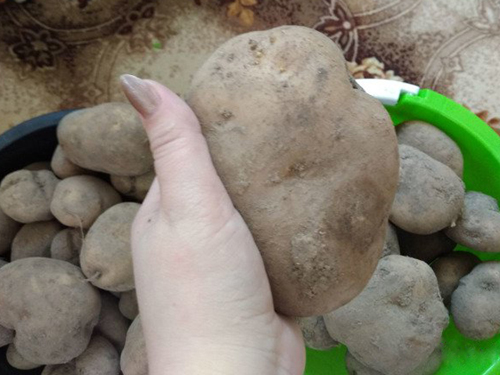
As mentioned, plants respond well to watering. But it should be said that they also tolerate short-term droughts very well. Thus, the variety does not need regular soil moisture, especially in the northern regions, but this event will definitely not be superfluous. Gardeners, by the way, note the resistance of plants to bad weather conditions. Even in the coldest and wettest seasons, you will still not be left without a crop!
This potato also responds well to fertilization in the soil, but does not require any special amount. Fertilize as needed, at dosages recommended for your specific soil type and region.
Digging should be carried out no earlier than September so that the tubers have time to fully ripen and gain sufficient mass. They can be stored for a very long time, they are not prone to germination, and even in the presence of slight mechanical damage, they very rarely rot.
The son is resistant to cancer, common scab, golden cyst nematode, Fusarium and Alternaria, black leg. It is also immune to late blight, however, due to the late ripening period, it can be affected by it, therefore it is advisable to carry out timely preventive treatment of plants, and mow the tops 2-3 weeks before harvesting. According to the observations of gardeners, the Colorado potato beetle does not particularly like these potatoes and pays attention to it only when there is already nothing to eat. But still, pest control measures should be taken. And it is not necessary to use "chemistry", you can do with folk remedies. This variety is very suitable for organic farming.
A separate point should be mentioned the resistance of this variety to degeneration. Seed material will have to be renewed very rarely, while you will always receive a stable yield of large tubers.
Perhaps, we have already listed all the main advantages of our hero. It is especially popular among gardeners due to its high yield, excellent taste, undemanding care and excellent keeping quality. The list of advantages can be continued for a long time, but it's worth talking about the disadvantages. The most important is the lack of official registration of the variety in the state register of plants of the Russian Federation and any other trusted sources. The sonny is a "dark horse" among the whole variety of potato varieties, which is why it is rather difficult to acquire seed material. Finding and buying is one thing, but making sure that this is really the same "hero" is a very difficult event. In general, whether there is 100% seed material of this variety, with a specific set of genetic characteristics, is a rather interesting question that needs a whole separate article. But if you nevertheless find a seller who is responsible for the quality of their products, and the potatoes clearly fit the description of Sonny, then you can safely try to grow this variety on your site and yourself will be convinced of its outstanding features.
